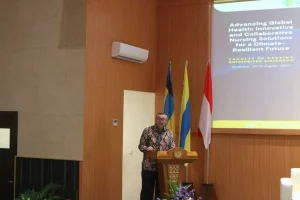UNAIR NEWS – Recently, the Head of the Traffic Corps of the Indonesian National Police (Kakorlantas Polri), Inspector General of Police Firman Shantyabudi, advised the citizens not to wear sandals when riding a motorcycle. The advice aims to minimize fatal accidents as motorcycles [accident] have a higher risk of fatality than other vehicles.
The appeal receives various reactions. Some people even expressed their disagreement through ironic jokes. Responding to that matter, UNAIR sociologist Prof Dr Bagong Suyanto Drs MSi shared his thought.
“Disagreement or resistance is a normal response, considering the people need to see the consistency from the law enforcer. If it is advised not to wear sandals during a motorcycle ride, it must be implemented equally, not discriminating against certain groups of people,” said Prof Bagong.
He further stated that the law enforcers in Indonesia have been inconsistent in upholding the law. There is still much discrimination or relaxation of rules for certain people. The indecision of law enforcers triggers the public to ignore the advice or regulation.
“If we’re talking about Singapore, it’s a different story. The laws are strict and firmly implemented. People who never follow the rules will obey the rules when they visit Singapore as the punishments are truly implemented,” said Prof Bagong.
From his perspective, he said it cannot be concluded that Indonesians are disobedient. As long as the implementation and dissemination are done properly, people will obey the rule, especially when the advice has a good purpose for the community.
“The key lies in the consistency of law enforcement. If that has been done, the community will comply,” he added.

Encouraging reward policy
Although there is still an opportunity for the community to obey, Prof Bagong prefers to give incentives (reward, ed) rather than advice. According to Prof Bagong, the idea will attract public attention.
“Therefore, the law enforcers do not have to issue advice as a firm rule. The people who obey the rules will be rewarded instead. They (the community, ed) will accept it better than just advice or rule that leads to sanctions or violations,” said the lecturer of the Faculty of Social and Political Sciences (FISIP).
Author: Fauzia Gadis Widyanti
Editor: Feri Fenoria









